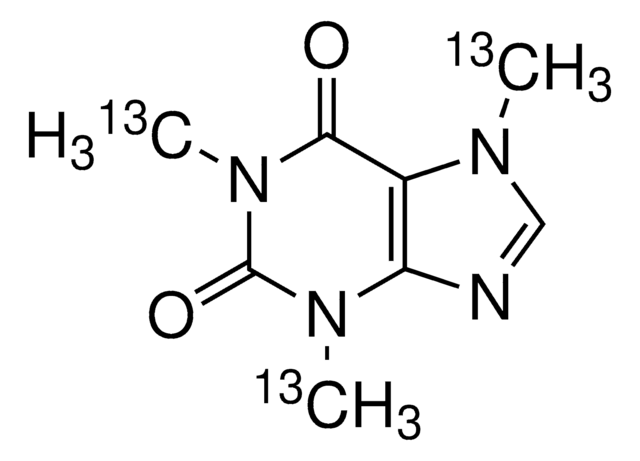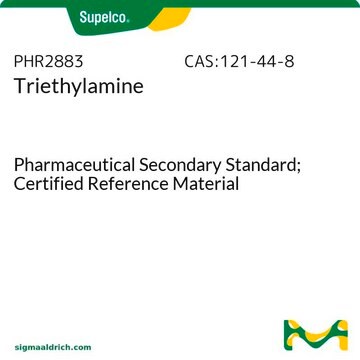30-4200
Triethylamine
SAJ special grade, ≥98.0%
Synonym(s):
N,N-Diethylethanamine
About This Item
Recommended Products
grade
SAJ special grade
vapor density
3.5 (vs air)
vapor pressure
51.75 mmHg ( 20 °C)
Assay
≥98.0%
form
liquid
autoignition temp.
593 °F
expl. lim.
8 %
availability
available only in Japan
refractive index
n20/D 1.401 (lit.)
pH
12.7 (15 °C, 100 g/L)
bp
88.8 °C (lit.)
mp
−115 °C (lit.)
density
0.726 g/mL at 25 °C (lit.)
SMILES string
CCN(CC)CC
InChI
1S/C6H15N/c1-4-7(5-2)6-3/h4-6H2,1-3H3
InChI key
ZMANZCXQSJIPKH-UHFFFAOYSA-N
Looking for similar products? Visit Product Comparison Guide
Signal Word
Danger
Hazard Statements
Precautionary Statements
Hazard Classifications
Acute Tox. 3 Dermal - Acute Tox. 3 Inhalation - Acute Tox. 4 Oral - Eye Dam. 1 - Flam. Liq. 2 - Skin Corr. 1A - STOT SE 3
Target Organs
Respiratory system
Storage Class Code
3 - Flammable liquids
WGK
WGK 1
Flash Point(F)
12.2 °F - closed cup
Flash Point(C)
-11 °C - closed cup
Regulatory Listings
Regulatory Listings are mainly provided for chemical products. Only limited information can be provided here for non-chemical products. No entry means none of the components are listed. It is the user’s obligation to ensure the safe and legal use of the product.
PRTR
Class I Designated Chemical Substances
FSL
Group 4: Flammable liquids
Type 1 petroleums
Hazardous rank II
Water insoluble liquid
ISHL Indicated Name
Substances Subject to be Indicated Names
ISHL Notified Names
Substances Subject to be Notified Names
JAN Code
30-4200-5-500ML-J:
30-4200-2-25G-J:
Choose from one of the most recent versions:
Already Own This Product?
Find documentation for the products that you have recently purchased in the Document Library.
Our team of scientists has experience in all areas of research including Life Science, Material Science, Chemical Synthesis, Chromatography, Analytical and many others.
Contact Technical Service





